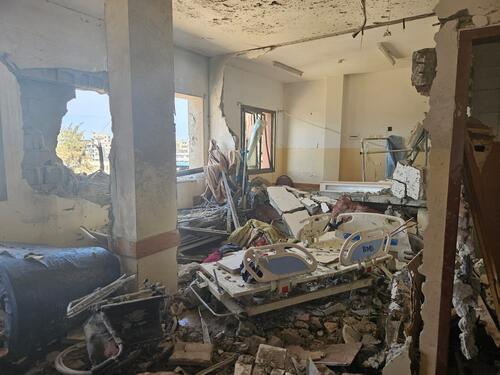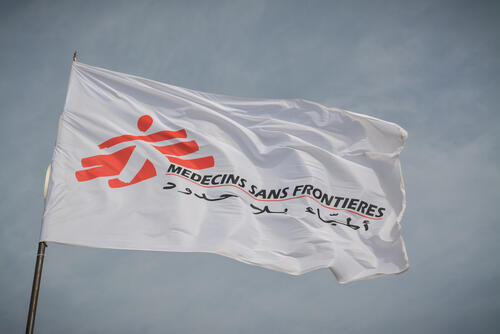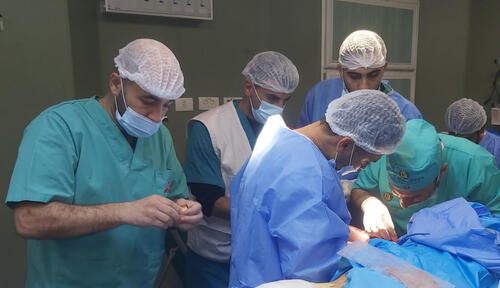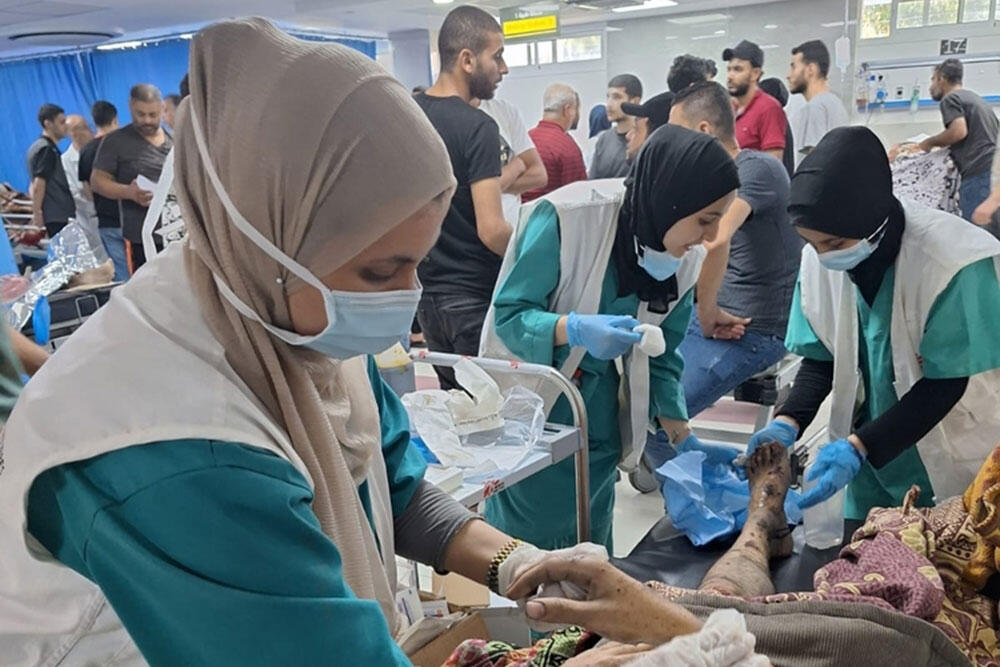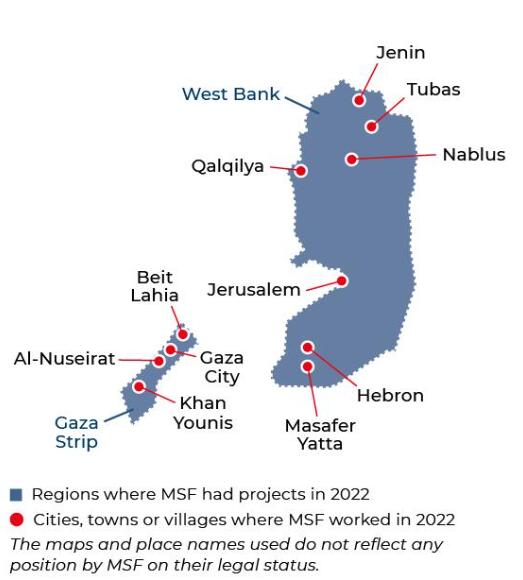Israel – Hamas conflict
An unprecedented humanitarian crisis is unfolding in Gaza. MSF teams have worked to treat the wounded and supply overwhelmed hospitals as indiscriminate airstrikes and a state of siege threaten millions of men, women and children.
Médecins Sans Frontières / Doctors Without Borders (MSF) is horrified by the events that began on Saturday 7 October – both the brutal mass killing of civilians perpetrated by Hamas in Israel, and by the massive attacks on Gaza now being pursued by the Israeli military.
MSF is calling for an immediate and sustained ceasefire to prevent more deaths and injuries, and for the protection of civilians and healthcare facilities at all times. We call on all parties involved to restore the scale and flow of humanitarian aid on which the survival of the people of Gaza depends.
Latest developments
-
As of 11 March, MSF operates at three hospitals (Al-Aqsa Hospital, Rafah Indonesian Field Hospital and El-Emirati Maternity Hospital), one primary healthcare facility (Al-Shaboura Clinic) and two healthcare centres in Al-Mawasi and Rafah.
-
Most MSF activities are mainly in the South of Gaza, but MSF also supports two hospitals in the north, Al-Awda Hospital and Al-Shifa Hospital.
-
In February, MSF staff remaining at Nasser Hospital – at that point, the largest hospital still functioning in Gaza – were forced to flee following an Israeli evacuation order and weeks of intense fighting nearby. On 15 February, a shell struck the hospital.
-
On 20 February, an Israeli tank fired on a clearly identified MSF shelter housing staff and their families. Two people were killed and six injured.
-
Our statement on Rafah: "Israel’s declared ground offensive on Rafah would be catastrophic and must not proceed. As aerial bombardment of the area continues, more than a million people, many living in tents and makeshift shelters, now face a dramatic escalation in this ongoing massacre... Nowhere in Gaza is safe."
Get the latest stories, below.
What is MSF doing in Gaza?
MSF is an independent, impartial and neutral humanitarian organisation. We operate based on medical need alone, going wherever that is greatest.
In Gaza, one of the most densely populated places on Earth, 2.2 million people were already living through a chronic crisis before what has become a humanitarian catastrophe.
As of 15 March 2024, over 31,000 people have been killed and 71,000 have been wounded according to local health authorities. A further 7,700 are estimated to be buried under rubble.
Over 1.7 million people are estimated to be forcibly displaced and living in appalling conditions that are unsafe and unhealthy. This number represents nearly 75 percent of Gaza's population.
From the start of the conflict, hospitals across the Strip have been completely overwhelmed and have faced running out of critical supplies. Some medical facilities have been hit by indiscriminate bombing while others have been under siege. Our staff have repeatedly spoken of the wounded screaming without painkillers, how already sick people cannot reach care, and the fear of being hit in an airstrike.
Now, after months of conflict, the threat of injury, illness and death has evolved beyond the violence.
In Gaza, the risk of infection has become incredibly high and is putting lives at risk.
Infected wounds are common with patients facing the double hit of unsanitary living conditions and a healthcare system that is unable to provide the in-hospital treatment and support that they need. Meanwhile, infectious diseases – including diarrhoea, respiratory infections and hepatitis – are increasingly reported across Gaza.
Pregnant mothers struggle to access maternity care and delivery rooms, leading to dangerous childbirth complications.
And, as food and water shortages deepen, the UN has warned that 40 percent of Gaza's people are at risk of famine.
MSF teams have been working in Palestine since 1989, providing trauma care, mental health services and running a specialist reconstructive surgery project. We currently have around 300 staff members in Gaza. The majority are Palestinian and many have now lost homes or family members in the violence.
Support our expert surgical teams working in crisis zones worldwide
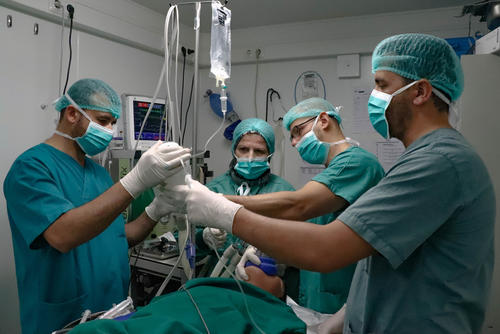
Medical support
- At the start of the crisis, we supported the four main hospitals in Gaza, including Al-Shifa, Al-Awda, Nasser, and the Indonesian Hospital, as well as several clinics.
- We have been treating the wounded since the first hours of the attacks. A large proportion of our patients have been children.
- On 9 October, we opened a clinic in downtown Gaza City for people with other injuries.
- We dispatched two surgical teams. On 10 October, we reopened an operating theatre at Al Shifa – Gaza’s main surgical hospital – to provide care to trauma and burns patients.
- On 1 November, all 22 MSF international staff unable to leave Gaza since 7 October successfully crossed the Egypt border via the Rafah Crossing.
- On 14 November, the first new team of 15 national and international staff entered Gaza via Egypt to begin medical and surgical support at Al-Aqsa Hospital in the 'Middle area' and Nasser Hospital in the south of Gaza.
- To date, activities in the north of the Strip remain limited and we face extreme challenges due to insecurity and the unpredictability of bombardments.
- On 15 November, Israeli forces entered Al-Shifa Hospital in Gaza City and we lost contact with our staff for three days. The hospital was later evacuated and MSF staff moved to support hospitals elsewhere in Gaza. On 6 January 2024, limited medical activities were able to restart. In January and March, MSF teams managed to reach the hospital with fuel and medical supplies.
- On 21 November, two MSF doctors were killed in a strike on Al-Awda Hospital. Dr Mahmoud Abu Nujaila, Dr Ahmad Al Sahar, and a third doctor working at Al-Awda, Dr Ziad Al-Tatari, died at one of the last remaining functional hospitals in northern Gaza.
- On 5 December, Al-Awda was surrounded by Israeli forces and effectively under siege. After 12 days, including incidents of medical staff and patients shot by snipers, the hospital was taken on 17 December. A number of staff and patients remained inside with extremely low supplies.
- Since the truce broke on 1 December, our teams at Al-Aqsa began to report almost non-stop fighting in the vicinity of the hospital. The security situation at Nasser also became volatile and at times intense, forcing the evacuation of some staff. Both hospitals responded to repeated 'mass casualty incidents'.
- In the south of Gaza, we began supporting surgical capacity at the European Hospital on 6 December. However as of 6 February, the security situation is making access to the hospital harder every day. Many of the surgical patients are children with trauma and severe burn injuries, who were wounded at the beginning of the war and now have their wounds infected due to lack of medical care.
- On 9 December, MSF restarted working at Al-Shaboura clinic in Rafah. As of February 6, the MSF team is providing outpatient services, including reproductive health services, wound dressing, mental health care and systematic malnutrition screening.
- MSF teams started working at the maternity unit at Al-Emirati Hospital on 13 December, and continue to work in around-the-clock shifts to care for post-partum women and those with pregnancy complications.
- In the first week of January 2024, we opened a project at the Rafah Indonesian Hospital to ease the pressure on other hospitals in the south. As of 6 February, the team is doing around 150 consultations a day, providing dressing, physiotherapy, and counselling.
- After days of intense fighting in the area, MSF took the difficult decision to evacuate staff from Al-Aqsa Hospital on 6 January as evacuation order flyers were dropped by Israeli forces. MSF teams have since returned and have also started wound care and rehabilitation services. Between 7 February and 7 March alone, the team dressed almost 2,500 wounds.
- On 13 February, Israeli forces issued an evacuation order to Nasser Hospital – at that point the largest hospital still functioning in Gaza. This followed weeks of intense fighting in the area that had driven severe medical supply shortages. On 15 February, a shell struck the orthopaedic department, forcing the remaining MSF staff to flee.
- Right now, many of our Palestinian colleagues continue to work and provide life-saving care while the most basic protections for hospitals and medical personnel are not guaranteed.
Logistical support
- Our logistics teams have delivered critical medical supplies to under-pressure hospitals across Gaza. We have also supported local healthcare authorities with donations from our medical stock.
- Due to the huge and uninterrupted influx of wounded people, some hospitals have faced a complete shortage of essential medicines and equipment.
- At the same time, getting new supplies into Gaza has been extremely difficult due to border restrictions and a large backlog of trucks at the Rafah Crossing on the border with Egypt.
- We have successfully managed to get over 100 tons of medical supplies into Gaza between October and February. The first delivery alone covered the needs for 800 surgical interventions and 20,000 outpatient consultations.
- Water and sanitation is an urgent concern. As of 14 March, MSF teams are providing an average of 220,000 litres of clean and safe water per day to more than 40,000 people from nine locations in Rafah. However, considering the immense needs, the amount of water distributed is just a drop in the ocean.
- Our teams continue to prepare more medical and humanitarian supplies to be sent to Gaza as soon as the situation allows it.
MSF wants to be able to access people in need of medical care and offer life-saving humanitarian services, but to do this we need basic guarantees of safety. We reiterate our calls for sufficient humanitarian aid and fuel to be allowed into Gaza and for healthcare staff and facilities to be protected.
MSF is an impartial organisation. So, we are sometimes asked why we do not currently run medical programmes in Israel.
We have offered our support to Israeli hospitals treating high numbers of casualties. However, Israel has strong emergency and health systems in place.
MSF focuses on filling gaps in healthcare and going wherever that need is greatest. Our teams are working in Gaza and the West Bank – as we have for 20 years – providing medical aid and supporting a healthcare system that urgently lacks both staff and supplies.
This is why we report on what our staff and patients are directly witnessing and experiencing in Gaza. Hospitals are becoming overwhelmed and facing shortages of drugs, medical supplies, and fuel for generators.
In-depth: Attacks on healthcare
Throughout the conflict in Gaza, there have been serious incidents of attacks on hospitals, violence against medical personnel and obstructions to healthcare.
Shockingly, more than 280 healthcare workers were killed between 7 October and 21 December - this includes five of our own staff. As of 28 December, 14 incidents of strikes on MSF medical facilities or vehicles have been recorded.
For example, the MSF-supported Al-Shifa Hospital was hit several times, resulting in injuries and deaths, in the lead-up to Israeli forces entering the complex on 15 November. The facility was soon evacuated and became unable to function. Elsewhere, MSF staff were killed in strikes on Al-Awda Hospital while clearly identified MSF vehicles have been destroyed by tanks.
The systemic use of evacuation orders affecting the areas around hospitals and the effective siege of multiple facilities has taken a shocking toll on the ability to both provide and access healthcare. The safety of patients, staff and displaced community members has been under serious threat.
Currently, no healthcare facility in Gaza is able to handle the large flow of wounded people.
Treating the sick and injured, as well as protecting medical personnel and facilities is at the core of International Humanitarian Law.
MSF reiterates its urgent call:
All parties to the conflict must sustain Gaza’s fragile healthcare system and protect the few remaining hospitals, ambulances and medical staff.
Get the latest updates on our response in Gaza:
🛑Indiscriminate and relentless attacks must stop now. Forcible displacement must stop now.
— MSF UK (@MSF_uk) December 4, 2023
🛑Assaults on hospitals and medical staff must stop now. Restrictions on aid and the siege must stop now.
🛑It must ALL STOP NOW. pic.twitter.com/O1jnbCnhK1
MSF in the West Bank
MSF’s medical and humanitarian activities in the West Bank have been affected by the escalation of violence and movement restrictions that have limited people’s access to essential services, including healthcare.
Our teams are currently supporting the emergency room in the Ministry of Health hospitals in Jenin and Tulkarem governorates. We equip volunteer paramedics in Jenin, Tulkarem and Nur Shams refugee camps with donations and training, so they can stabilize patients during active hostilities and keep them alive until they reach hospitals.
Across the West Bank, attacks on and obstructions to healthcare have become frequent. Khalil Suleiman Hospital in particular has had bullets and tear gas fired at the facility, and access by ambulances and patients blocked. On 14 December, Israeli forces shot and killed a teenage boy inside the hospital compound.
In the West Bank city of Hebron, MSF medical teams are providing care through 10 mobile clinics for people who would otherwise be cut off from care. We support four primary health centres and two hospitals, and have provided donations of supplies and staff training to others.
In Nablus, MSF teams continue to provide local people with mental health care.
